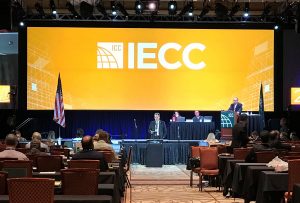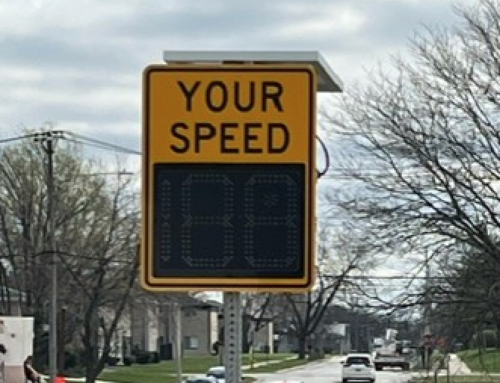 CHICAGO (Oct. 31, 2019) –The Metropolitan Mayors Caucus Environment Committee Chairman, City of Geneva Mayor Kevin Burns, testified to improve energy efficiency building codes at the International Code Council (ICC) public comment hearings in Las Vegas.
CHICAGO (Oct. 31, 2019) –The Metropolitan Mayors Caucus Environment Committee Chairman, City of Geneva Mayor Kevin Burns, testified to improve energy efficiency building codes at the International Code Council (ICC) public comment hearings in Las Vegas.
“On behalf of the 128 communities, three counties and the nearly six million people represented by the Greenest Region Compact, we support all efforts for greater energy efficiency and more flexibility for developers, builders and code officers to achieve said efficiencies,” Mayor Burns said. “Code officers, we as mayors got your back.”
After advocating for stronger energy efficiency requirements to combat climate change and showing support for code officers who carry out this work, Mayor Burns left the hearing. However, his impact was quickly made apparent by the next speaker. Tim Ryan, executive director of the International Association of Building Officials, thanked Mayor Burns for participating and said it was the first time a Mayor had attended an ICC public comment hearing. Ryan said he hoped more Mayors would participate in the process and commended Mayor Burns again. The room erupted in applause, which one organizer said never occurs at these hearings.
It is important for municipal leaders to give feedback and vote on proposed changes to the International Energy Conservation Code (IECC) because they can stand up for lower energy costs and better building standards for their constituents. Buildings use 40% of the nation’s energy and account for 50% of the greenhouse gas emissions in our region. The National Renewable Energy Lab (NREL) identified building energy codes as the most impactful policy action cities can take to meet Paris Accord GHG reduction targets. According to a recent New York Times article, the National Association of Home Builders (NAHB) prioritized keeping the up-front costs of homes lower instead of allowing for building code changes that would improve energy efficiency and better address climate change. The NAHB holds significant influence over two committees responsible for the International Residential Code, which regulates home construction and the energy efficiency of new homes.
The ICC, a nonprofit that develops building codes used in the United States and several other countries, met in Las Vegas to review proposed changes to building codes. Every three years, the ICC follows a process to update the International Building Code that includes soliciting feedback on proposed code changes at committee action hearings, public comment hearings and through eligible voters casting online votes. The MMC Environment Committee meeting has been educating municipal leaders about their opportunities to engage in the process to develop modern energy conservation codes that align with Greenest Region Compact goals.
Governmental Member Voting Representatives (GMVR) have until Dec. 6th to vote at the ICC site online. The Energy-Efficient Codes Coalition offers directions to navigate the voting process and a time-saving voter’s guide to the high commercial and residential energy efficiency priority proposals.





